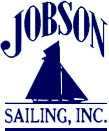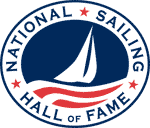By Gary Jobson
September 25, 2013
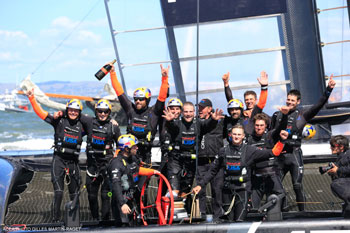 Today's victory by Team Oracle USA concluded an America's Cup that will add quite a unique chapter to the long history of this regatta. At the post race press conference, team owner Larry Ellison was on stage. He was gracious, funny, respectful, interesting and happy. I sat among the 100 or so journalists, thinking to myself, "Where has this guy been?" Ellison explained that he was absent because he simply wanted to support his team, and let them run the defense. There was no doubt, however, who was in charge. Alongside Ellison were the Australian skipper of OTUSA, James Spithill, the Australian strategist, Tom Slingsby, and the British tactician, Ben Ainslie. The team leader, New Zealander, Russell Coutts was not on stage, and he was missed. Ellison gave Coutts considerable credit for pushing the team to improve when they were behind. Something happened during 19 races over the past 19 days that took the American team from awful to spectacular.
Today's victory by Team Oracle USA concluded an America's Cup that will add quite a unique chapter to the long history of this regatta. At the post race press conference, team owner Larry Ellison was on stage. He was gracious, funny, respectful, interesting and happy. I sat among the 100 or so journalists, thinking to myself, "Where has this guy been?" Ellison explained that he was absent because he simply wanted to support his team, and let them run the defense. There was no doubt, however, who was in charge. Alongside Ellison were the Australian skipper of OTUSA, James Spithill, the Australian strategist, Tom Slingsby, and the British tactician, Ben Ainslie. The team leader, New Zealander, Russell Coutts was not on stage, and he was missed. Ellison gave Coutts considerable credit for pushing the team to improve when they were behind. Something happened during 19 races over the past 19 days that took the American team from awful to spectacular.
First a review of today's big finale: A brisk wind blew in out of the WSW at 17-21 knots. With a strong 1.4-knot flood current, the wind limit was 24.4 knots. Everyone in San Francisco and around the world interested in the America's Cup was relieved that we would have a race today. Emirates Team New Zealand won the start at the leeward end of the line and held an overlap at the first turn. 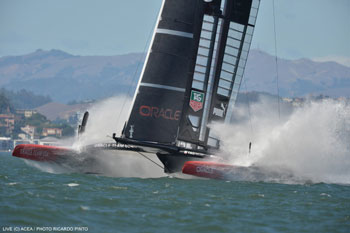 Just as the two AC 72s arrived at Mark One, USA took a severe nosedive. The thought of another disaster flashed in my head. But James Spithill steered his catamaran out of harm’s way. On the three-mile run to the leeward gate, NZL held a two-length lead. When USA 17 jibed, the Kiwis covered closely. They did not make the same mistake made yesterday when they failed to cover while leading. The boats split courses at the gate. NZL headed for the favored right side of the course that had considerably less current. USA 17 started foiling to windward at 30 knots. Soon the boats were even. Yesterday, in Race 18, USA 17 got around NZL due to sloppy tactics by the Kiwis. This time the American team passed on pure speed. It was impressive. Spithill and his crew never looked back. Closing in on Mark Four Spithill even smiled, a first in this tension-backed regatta. He guided USA 17 across the finish line to cheers of 10,000 spectators on land, and millions watching on television around the world. The Kiwis gave it their best, but just weren't fast enough.
Just as the two AC 72s arrived at Mark One, USA took a severe nosedive. The thought of another disaster flashed in my head. But James Spithill steered his catamaran out of harm’s way. On the three-mile run to the leeward gate, NZL held a two-length lead. When USA 17 jibed, the Kiwis covered closely. They did not make the same mistake made yesterday when they failed to cover while leading. The boats split courses at the gate. NZL headed for the favored right side of the course that had considerably less current. USA 17 started foiling to windward at 30 knots. Soon the boats were even. Yesterday, in Race 18, USA 17 got around NZL due to sloppy tactics by the Kiwis. This time the American team passed on pure speed. It was impressive. Spithill and his crew never looked back. Closing in on Mark Four Spithill even smiled, a first in this tension-backed regatta. He guided USA 17 across the finish line to cheers of 10,000 spectators on land, and millions watching on television around the world. The Kiwis gave it their best, but just weren't fast enough.
The 34th America's Cup defense reminded me of a Usain Bolt 100-meter dash. Out of the gates another runner often takes a quick lead. After 40 meters, Bolt gains and is even with the leader. By the 60-meter mark Bolt has the lead, and stretches to a huge win. Oracle Team USA was behind but sure came on strong. It makes me wonder how much faster they would get if racing continued for another week?
I doubt anyone in New Zealand was cheering, but I am sure they respected the USA turnaround. No one was more impressed than ETNZ's skipper, Dean Barker. He and team leader, Grant Dalton, admitted they knew they were in deep trouble the day before when Oracle easily stretch out on Leg 3. The Kiwis were hurting, but to the person they were gracious and good sports. All 107 members of their team were on the stage for the prize giving. Both crews shared hugs and handshakes on the pier next to the America's Cup Park.
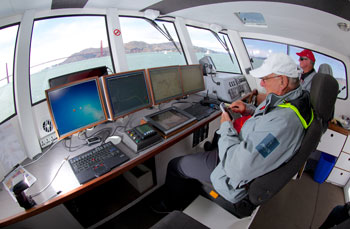 I have been part of this edition of the Cup since April, 2012. It was most heartwarming to see the world suddenly take notice. Stories appeared today on the front page of the New York Times. The Wall Street Journal and scores of other newspapers around the world. It was a great story. The score was 8-8. The winner would claim the Cup. USA 17 had won seven straight races. Emirates Team New Zealand looked great early but never seemed to get better. Although Barker did say they were a lot faster in the Cup than in the Louis Vuitton challenger trials. The big question is, what did Oracle do to improve so much? Ellison seemed to want to explain everything at the press conference. Unfortunately, he held back. Spithill and Ainslie had nothing to add.
I have been part of this edition of the Cup since April, 2012. It was most heartwarming to see the world suddenly take notice. Stories appeared today on the front page of the New York Times. The Wall Street Journal and scores of other newspapers around the world. It was a great story. The score was 8-8. The winner would claim the Cup. USA 17 had won seven straight races. Emirates Team New Zealand looked great early but never seemed to get better. Although Barker did say they were a lot faster in the Cup than in the Louis Vuitton challenger trials. The big question is, what did Oracle do to improve so much? Ellison seemed to want to explain everything at the press conference. Unfortunately, he held back. Spithill and Ainslie had nothing to add.
Ellison did say they made many changes, and that Russell Coutts was the person behind the scenes pushing. Spithill laughingly pointed out that he was reminded by Coutts that he (Spithill) had now skippered in 13 America's Cup race victories, but that he (Russell) had won 14. I am sure we will see Spithill at the helm again. He is 34 and proved his ability to lead a team out of a deep hole.
At the press conference, I asked Larry Ellison if they had received a hip pocket challenge for the next America's Cup. He responded that they had, but would announce who it was in the coming weeks. He also said they wanted to consult with other potential teams about the boats, and venue. Ellison would not commit to San Francisco for a future Cup.
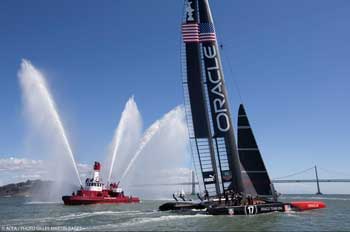 Many volunteers around the San Francisco Bay area participated on and off the water to make the regatta a success. The Bay Area Yacht Club Alliance has supported the Cup for the past two years. There were ten yacht clubs that participated. The U.S. Coast Guard was on patrol every race day. Capt. Matt Bliven was in overall charge. He is retiring on Sat., Sept 27. He and his staff were extremely helpful throughout the Cup. The U.S. Coast Guard has been part of every America's Cup held in U.S. waters since 1958.
Many volunteers around the San Francisco Bay area participated on and off the water to make the regatta a success. The Bay Area Yacht Club Alliance has supported the Cup for the past two years. There were ten yacht clubs that participated. The U.S. Coast Guard was on patrol every race day. Capt. Matt Bliven was in overall charge. He is retiring on Sat., Sept 27. He and his staff were extremely helpful throughout the Cup. The U.S. Coast Guard has been part of every America's Cup held in U.S. waters since 1958.
After the race I hustled back to shore and joined my co-commentators Todd Harris and Ken Read in the booth. We laced our thoughts between the prize-giving and post-race activities. One of the great pleasures of the Cup was working with Todd, Ken, our producer, Leon Sefton, and director, Wayne Leonard. 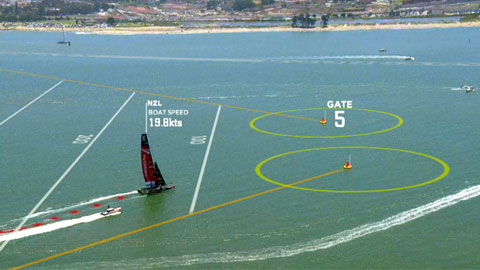 When our program dipped to black, all 92 members of our production team poured out of our various studios and areas. There were big hugs, and many tears (me included). Everyone knew a new high television production standard had been set, not only for covering sailing, but for sports television. The technology of the broadcast from the on board cameras by SIS, AC LiveLine graphics, Virtual Spectator animation, perfectly stabilized aerial and water view images, the clear sound from the sailors, the features, interviews and special moments all came together for this all important showdown.
When our program dipped to black, all 92 members of our production team poured out of our various studios and areas. There were big hugs, and many tears (me included). Everyone knew a new high television production standard had been set, not only for covering sailing, but for sports television. The technology of the broadcast from the on board cameras by SIS, AC LiveLine graphics, Virtual Spectator animation, perfectly stabilized aerial and water view images, the clear sound from the sailors, the features, interviews and special moments all came together for this all important showdown.
In a few years there will be another America's Cup. Based on the history of the Cup, there will be more fascinating stories, intriguing personalities, many twists and turns, triumphs and disappointments that will extend the narrative. 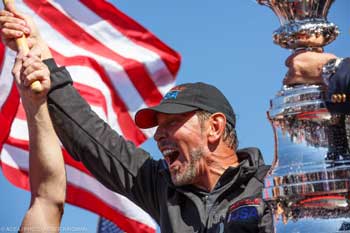 One thing that never changes is that the America's Cup attracts highly motivated people who want to compete at the highest level. To get your boat's name engraved on the oldest trophy in international sports is hard, but when you do, the effort is worth it. Larry Ellison will have his boat's name engraved on the Auld Mug for the second time.
One thing that never changes is that the America's Cup attracts highly motivated people who want to compete at the highest level. To get your boat's name engraved on the oldest trophy in international sports is hard, but when you do, the effort is worth it. Larry Ellison will have his boat's name engraved on the Auld Mug for the second time.
I will have more to say about the future of the America's Cup in the November issue of Sailing World magazine. Thanks for reading my AC Reports. From San Francisco, I am signing off.
Some photos courtesy of Gilles Martin-Raget and © ACEA.
Photo Credits: Gilles Martin-Raget, Ricardo Pinto, R. Steven Tsuchiya, Abner Kingman.
